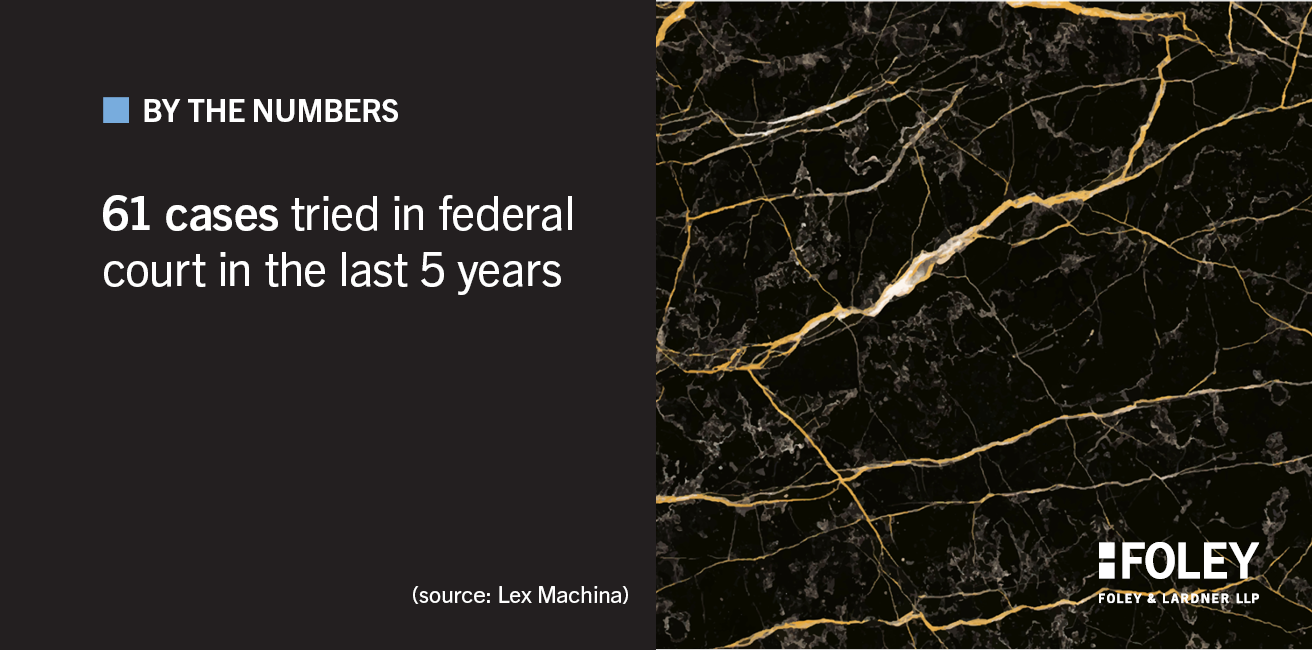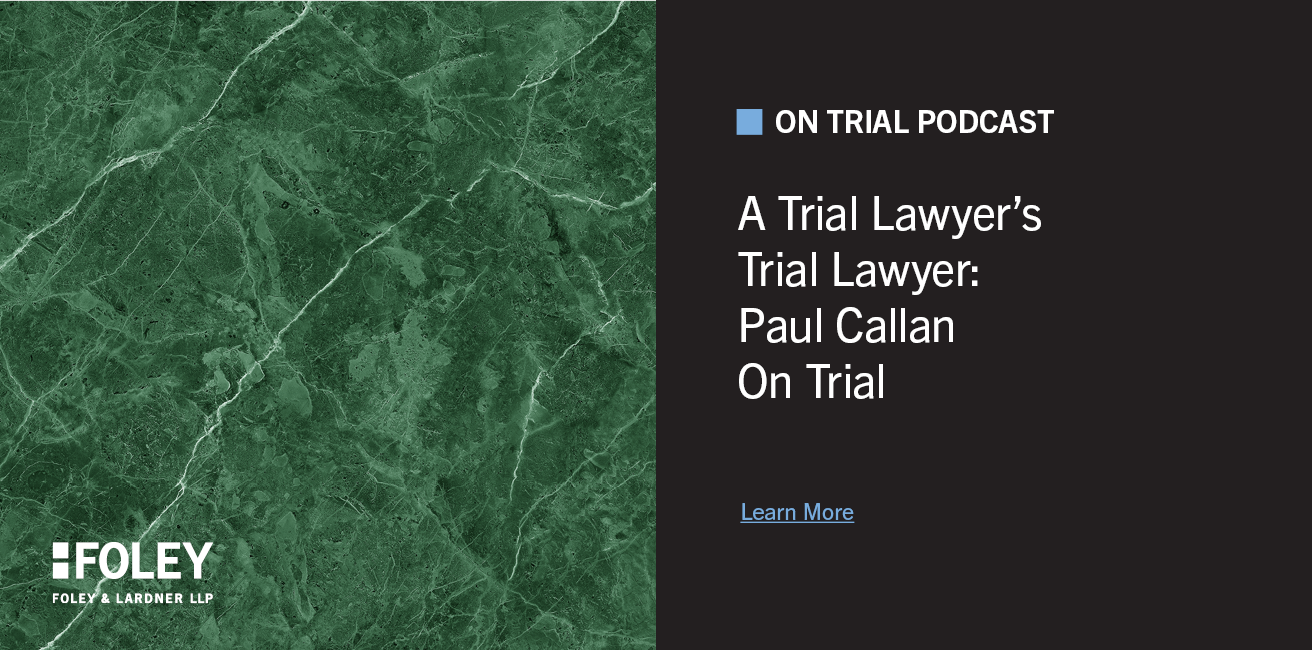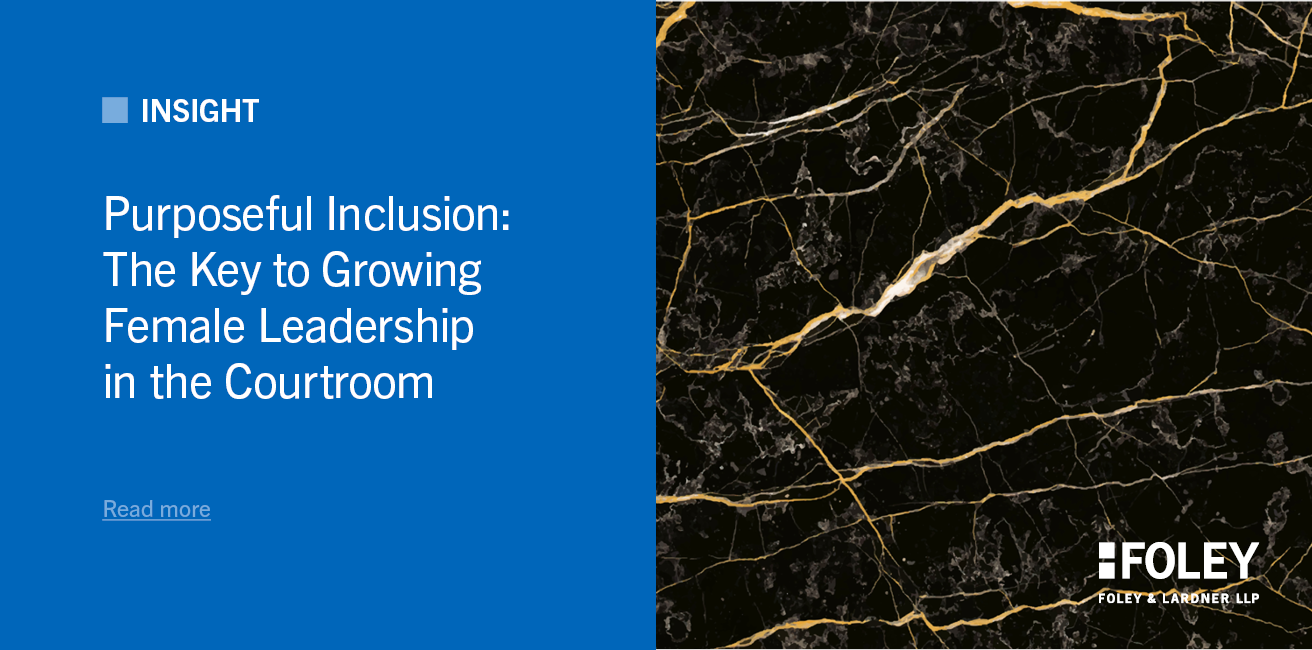Trial Team
Foley’s trial attorneys deliver. We have a proven track record of success in virtually every major jurisdiction — and local experience matters. Our deep understanding of area courts, rules, judges, and jury pools gives us a strategic edge that benefits your company in the short and long terms.
Our litigators are experienced winners in complex cases across key sectors including manufacturing, technology, healthcare and life sciences, and energy. We are confident we can summon the right attorney at a moment’s notice so we are ready to win at trial. When we go to trial, your risks and needs are ours, too.
We’re committed to not only achieving success for our clients, but also developing the next generation of litigators. Our trial teams combine seasoned partners with rising talent, ensuring we’re ready for trial today . . . and when we win, we are ready for the next one.

Recent Victories
For more than seven years, the Federal Trade Commission accused Neora, LLC and its founder Jeff Olson of violating the FTC Act by operating a pyramid scheme, making income and product misrepresentations and providing distributors, which the FTC alleged were Neora’s agents, with the means and instrumentalities to make such misrepresentations. Following a bench trial in the Northern District of Texas, the court issued a ruling vindicating Neora and Mr. Olson of all allegations asserted by the FTC. The court’s ruling against the FTC was labeled “historic” because no other direct selling company has ever obtained a trial victory in a pyramid scheme lawsuit filed by the FTC. It also is the first victory of its kind since Amway’s 1979 administrative law defeat of the FTC. As summarized by the Direct Selling Association in its supporting amicus brief, had the FTC been successful in pursuing its new and vague “overemphasis on recruiting” test, it would have had “a profound impact on the state of the law and negatively impact[ed] operations of a sizeable portion of the United States economy.”
During the bench trial, the Foley team presented compelling testimony from several Neora executives and expert witnesses, establishing that Neora is a legitimate direct selling company that neither makes income or product misrepresentations nor provides its distributors with the means and instrumentalities to make such misrepresentations.
The court’s judgment put to rest allegations that began in 2016, when the FTC sent Neora a civil investigative demand. For three years, Foley’s State Attorneys General/FTC Practice members Ed Burbach, Jay Varon, Rob Johnson, Kristina Silcocks, and John Sepehri led the Foley team responding to the CID, with Frank Pasquesi and Jon Israel providing local team leadership in dueling litigation in Illinois and New Jersey.
The Foley trial consisted of partners Ed Burbach, Craig Florence, and Michelle Ku and included of counsel John Sepehri, special counsel Robert Johnson, and associate Stephanie McPhail. In recognition of this victory, partners Ed Burbach, Craig Florence, and Michelle Ku were named as “Litigators of the Week” by American Lawyer.
Foley represented Mueller Supply Co., a leading manufacturer of steel buildings in Texas and other states. In 2015, Mueller added a 3D Design Tool to its website, which allowed customers to configure in real-time — in terms of size, colors, doors, windows, and a host of additional features — the steel building they were contemplating buying.
In late 2020, Mueller learned that a competitor, JNL Steel Components, Inc., had knocked off its 3D Design Tool. Mueller sent JNL a cease-and-desist letter in February 2021 and, when JNL failed to comply, Mueller sued JNL and its website developer, Web Plant Media, for copyright infringement.
Although liability and damages issues were hotly contested, the main challenge in the case was convincing the jury that Mueller was entitled to a portion of JNL’s profits related to the sale of steel buildings. Because JNL did not have any direct profits related to the use of its 3D Design Tool, Foley sought JNL’s indirect profits, i.e., based on JNL’s sales of steel buildings that could be configured using the 3D Design Tool.
In February 2023, the case was tried over six days in federal court in San Angelo, Texas. The jury found Web Plant Media liable as a direct infringer and JNL liable as a vicarious infringer. The jury awarded Mueller over $2.1 million in JNL’s indirect profits. Post-trial, JNL paid the damages award in full and both defendants stipulated to a permanent injunction barring them from using any aspect of Mueller’s 3D Design Tool.
The multi-office and multi-department trial team consisted of Litigation Partner Naikang Tsao (Madison), IP Litigation Partner Terrell Miller (Houston), Associates Davis Mosmeyer Ill (Dallas) and Emily Jones (Madison), and Paralegal Tanya Durham (Dallas).
Foley obtained a complete defense verdict, on behalf of a mobility company, in a wrongful death jury trial in the Circuit Court of Dale County (Ozark), Alabama. The case arose out of a multicar accident in rural Alabama: An employee of the client, who was responsible for shuttling cars between rental locations, left his lane of travel, crossed a median, and entered the oncoming lane of traffic, which resulted in a multicar accident and the death of both the employee and another driver.
The plaintiff, who was the representative of the estate of the other driver (who also died), asserted claims against our client and the employee’ s estate under Alabama’ s Wrongful Death Statute and common law tort theories. Our client defended the case on the grounds that the employee suffered a sudden medical emergency and/or loss of consciousness, an affirmative defense under Alabama law.
The plaintiff was severely disadvantaged at trial, to the point that plaintiff’s counsel called on employees of our client as its own witnesses — which backfired when Foley was then entitled to cross examine our client’s employees and easily get all the evidence needed to refute the plaintiff’s claim and establish a defense. Plaintiff’s counsel spent the majority of the trial arguing for backdoor ways to get the excluded evidence before the jury, but the limine motions held up, which was no small feat, as the judge had earlier awarded our client a complete summary judgment win, only to reverse himself on reconsideration without providing any reasoning for having done so. The decision was subsequently appealed, and the Alabama Supreme Court affirmed the judgment.
The trial team that achieved this victory included Jeffrey Soble, Katlin Cravatta, and Bill Guthrie.
A team of Foley litigators notched a big defense win for a manufacturing client in a hotly contested trade secret case, when the plaintiff and its counsel waved the white flag and stipulated to dismissal of their remaining claims with prejudice.
The plaintiff filed a federal Complaint and Motion for Preliminary Injunction in the Eastern District of Wisconsin against our client and a senior employee who previously worked with the plaintiff, alleging a laundry list of trade secret, breach of fiduciary duty, contract, tortious interference, and aiding and abetting claims. According to the plaintiff, our client used a proprietary analytical “tool” to promote the growth and improvement of its business and touted the tool as a key component of its strategy during one or more investor presentations. The plaintiff employed an aggressive strategy, demanding injunctive relief and serving expansive and invasive discovery.
The Foley team prepared a motion to dismiss, opposed the preliminary injunction motion, and implemented a discovery strategy intended to reveal that the plaintiff was on a fishing expedition and lacked any cognizable damages. The court dismissed all but the plaintiff’s breach of fiduciary duty claims and denied the motion for a preliminary injunction, finding that the contractual restrictions on the plaintiff’s former employee were unenforceable under Wisconsin law and holding there was nothing proprietary, novel, or secret about the alleged “tool.”
The plaintiff was initially undaunted and continued to pursue aggressively its sole remaining claim of breach of fiduciary duty. Our team kept pushing by demanding depositions and targeted discovery that the plaintiff could not easily evade and that would reveal fully its lack of damages. After an exhaustive series of discovery meet and confers, when it appeared that the parties were headed for competing motions to compel, the plaintiffs gave up and dismissed with prejudice, no strings attached. By focusing intently on key, dispositive issues, Foley delivered a complete victory for our client while minimizing the duration and cost of this potentially invasive and expense litigation.
On October 9, 2023, Judge Curtis E.A. Karnow issued a Statement of Decision rendering a complete defense verdict for two Foley clients, a large national bank and an individual defendant.
The plaintiff had convinced the national bank to create a job specially for her, based on certain threshold commitments within her first six months on the job. After more than seven months on the job without success, the plaintiff fell extremely ill, but when she returned to work after three months, her medical providers released her without any restrictions at all. The plaintiff herself disclaimed any inability to perform her job other than needing some flexibility in her working hours to attend follow-up medical appointments (which was provided). Her employer had to begin holding her accountable through a series of performance plans after the plaintiff was still not delivering results, and at that point she claimed should receive accommodations in the form of more time to deliver results — which the bank provided. However, after an additional eight months of time to perform, the employer terminated her employment.
The Court’s Statement of Decision illustrates just how effectively the Foley trial team pieced together careful documentation kept by the co-defendant and the national bank, both, to tell a compelling story of poor performance and to destroy the credibility of the plaintiff and her arguments. The court relied many times in its decision on Foley’s cross exam of the plaintiff, repeatedly identifying where the plaintiff changed and contradicted her own testimony, where her statements did not square with objective documentation, and where her excuses for her poor performance simply lacked credibility. The court concluded the plaintiff “didn’t come close to performing under [her business plan] in the 7 months before her leave, nor in the 11 months after her return.”
Foley secured an important victory for a pharmaceutical client in a contentious contract arbitration against two market competitors and suppliers. The trial team successfully conducted a multi-witness, weeklong arbitration in Amsterdam to obtain a multimillion-dollar award for our client. The Foley team also defeated respondents’ counterclaim, which asserted that our client had been the breaching party.
The matter arose after respondents committed in 2017 to supply their lifesaving drug to our client through year-end 2019. In reliance on this commitment, our client entered into supply agreements with major state-owned health care entities and committed to supply over half of the country’s needs for this period. In 2018, following a worldwide shortage of the drug, respondents saw an opportunity to supply other countries at substantially higher prices than they were earning under the parties’ agreement. The move left our client’s customers in crisis because they initially could not procure sufficient alternatives to serve patients who depended on the drug, and even when alternatives were found, they cost substantially more. These clients then passed on this additional cost to our client, which therefore brought an arbitration for respondents’ breach of their contract obligations. Because our client originally sought an emergency injunction abroad before it arbitrated, respondents counterclaimed that this breached the duty to arbitrate.
Foley won a complete defense verdict for a large shipping and supplies company, on an employment/disability discrimination and retaliation case, after a four-week jury trial in San Bernardino County Superior Court. The plaintiff had worked for more than 10 years at one of our client’s warehouses, during which time he experienced multiple work- and non-work-related injuries requiring extensive periods of accommodation. Our client always provided the plaintiff with reasonable accommodation, but that did not stop him from alleging disability discrimination and retaliation after the company let him go, following a precipitous decline in performance coupled with a toxic attitude and inappropriate and unprofessional conduct.
Following several critical wins for our client on key motions in limine and almost three full days of prolonged jury selection, the trial began in earnest and required the Foley team to defend what quickly became a smear campaign of the client and the plaintiff’s former managers, given the less-than-sympathetic story the plaintiff spun about his own circumstances. This required the Foley trial team to systematically present nearly 10 years’ worth of evidence to show just how generous the company had been to the plaintiff, while simultaneously deconstructing the façades of the plaintiff’s misleading arguments. The Foley team worked to put together a compelling closing argument to show that a full verdict in our client’s favor was the only outcome the evidence supported.
After nearly four days of deliberations, the jury read out a complete defense verdict for our client.
Foley obtained an important victory for an insurance company client in a reinsurance arbitration hearing. In 2016, our client received a notice from one of its major reinsurers, seeking to raise rates on seven in-force reinsurance agreements between the parties. On the advice of the Foley Reinsurance Team, our client refused to pay the rate increases on the basis that they were counter to the language of the parties’ contracts, the terms of their business deals, and industry custom and practice. The reinsurer then demanded arbitration under all seven of the agreements.
After extensive discovery, the final evidentiary hearing was conducted virtually during the COVID-19 pandemic, over the course of seven hearing days. The hearing involved nine fact witnesses and four experts. Because of the pandemic, Foley also was required to prepare all of its witnesses virtually. Following the hearing, the panel of three neutral arbitrators issued a unanimous ruling in favor of our client, which the client has valued at a more-than $100 million victory.
Foley secured a significant trial victory for a major consumer foods manufacturer in a contentious contract arbitration against one of its former distributors. In addition to obtaining a $2 million judgment for our client, the trial team obtained the denial of the distributor’s counterclaims, including a breach of contract claim for over $12 million in damages.
Our client sought $2.1 million for product that the distributor ordered and received under its distribution agreements with our client (and resold at a profit) but failed to pay for. Meanwhile, the distributor sought over $12 million in damages, stemming from our client’s termination of its agreements with the distributor, which our client effected after it discovered that the distributor was secretly building a competing business — including by hiring away key client personnel. Despite the clear “at-will” terms of the agreements, the distributor contended that our client had no right to terminate the distributorship. The distributor also claimed it was entitled to withhold payment on its outstanding accounts-payable balance because it had received defective products. As the Foley team amply demonstrated at trial, however, the distributor had no legal basis to challenge our client’s termination of its distributorship, and its failure to pay was based on its desire to punish our client for exercising its contractual right to terminate.
Following months of hard-fought motion practice and discovery (including a successful client TRO as well as substantial expert discovery in connection with three proffered expert witnesses), the Foley team flew to Chicago and successfully tried the case.
Foley attorneys secured a victory on behalf of the Los Angeles County Board of Supervisors, when the Los Angeles County Superior Court denied a county resident’s petition that sought to block return of Bruce’s Beach, a Black-owned property illegally condemned in the 1920s, to the legal heirs of Charles and Willa Bruce.
Bruce’s Beach was a popular Black-owned resort in the City of Manhattan Beach, which catered to Black beachgoers in the 1910s and ’20s. In 1924, the City of Manhattan Beach condemned Bruce’s Beach in an act of racial discrimination, seeking to drive out Black patrons from Manhattan Beach. Acknowledging this profound historical wrong, Governor Gavin Newsom signed Senate Bill 796 into law, enabling the county to take appropriate actions to return Bruce’s Beach to the legal heirs of the Bruce family.
Foley partner and the County’s lead counsel Byron McLain successfully argued that returning the property to the Bruce family is not an improper gift, in violation of the California Constitution, because this act serves a clear and direct public purpose of addressing and redressing government racial discrimination.
Upon the ruling, McLain commented, “The Superior Court’s decision to allow the County of Los Angeles to transfer the Bruce’s Beach property back to the Bruce family is a huge step in support of the County’s concerted call to action for government entities to recognize and dismantle the history of racial oppression, injustice, and inequity that has left an indelible stain on this nation — most especially its communities of color.”
JB Exploration I, LLC (“Jay-Bee”), a West Virginia oil & gas exploration and development company, hired Foley to take over as lead counsel for a lawsuit in West Virginia. The Foley team consisted of Energy Litigation team members Geoffrey Bracken and Vi Tran.
Jay-Bee and Blackrock had entered into a Lease Acquisition Agreement (LAA) in 2013, whereby they agreed to jointly acquire and thereafter develop oil and gas leases in and around Pleasants County, West Virginia. After years of Blackrock’s continued and repeated failure to comply with its LAA obligations, Jay-Bee brought suit to terminate the LAA. Blackrock filed counterclaims asserting that Jay-Bee also had breached the LAA, that Jay-Bee could not terminate the LAA, and that Blackrock was entitled to a 25% interest in all leases acquired and wells drilled. In total, Blackrock sought over $45 million in damages, based on the value of oil and gas leases and the future profits of wells drilled on those leases.
The Foley team — all experienced oil & gas litigators — instructed the court as to the proper law that should control. Specifically, rather than submit the case to the jury on erroneous breach-of-contract issues, as had been pled by Jay-Bee’s prior counsel, Foley demonstrated that the proper legal issue to be decided was whether a de facto “mining partnership” had been created under West Virginia law, which determination necessitates the application of the Revised Uniform Partnership Act. The jury found that (1) both parties breached the LAA, but Blackrock committed the first breach on February 4, 2014; and (2) the LAA terminated on November 11, 2017. The jury’s findings effectively discharged the majority of Jay-Bee’s obligations under the LAA and guaranteed that damages would be limited, as there were no wells drilled on the leases as of the date the jury determined the LAA terminated. The case was remanded by the West Virginia Supreme Court for further proceedings.
Foley scored a victory on behalf of a pro bono client, in federal district court, in an action brought pursuant to the Hague Convention on the Civil Aspects of International Child Abduction. The Hague Convention is an international treaty aimed at deterring parents from abducting their children to a country whose courts might side with them in a custody battle. Those wrongfully removed from their country of habitual residence must be returned unless the abductor can prove one of the defenses allowed by the Convention.
Foley’s client was the mother of a six-year-old boy who spent the first three years of his life in Brazil. Seeking better economic opportunities, and following incidents of domestic violence involving the child’s father, the client and her son traveled from Brazil to the United States in 2019 and joined her parents and brother, who were already living and contributing to the community of Martha’s Vineyard in Massachusetts. During a three-day bench trial, featuring both live and remote witnesses (most of whom required a translator), the Foley team presented evidence that the child’s father had waited too long to file his petition, in early 2022, and that the boy had become well settled in the United States during that time, which is an affirmative defense to a claim of wrongful retention.
The case presented a challenging set of facts. Ultimately, however, the court refused to order the child’s return to Brazil, finding that he was, in fact, well settled. The court cited his close-knit extended family in the United States, his community ties, his progress learning English, and his generally sweet disposition.
The child’s father appealed this decision to the First Circuit, arguing that the district court had erred when it determined the child was well settled in the United States, including because Judge Burroughs relied on evidence from after the time the petition for return was filed, and because the court did not appropriately weigh the evidence. Ruben Rodrigues, with assistance from associate John Custer, briefed the issues on appeal and argued before the First Circuit panel. In February 2024, the appeals court affirmed the judgment of the district court, disagreeing with all grounds presented by the child’s father.
After more than four years of contentious litigation, a California federal jury found that a Foley client, a transportation services company, did not infringe a rival’s patent and agreed with our client’s claims that the rival engaged in unfair competition.
After the USPTO issued a patent to the rival, the company immediately began accusing our client and its customers of infringing the patent. There was no good-faith basis to support the rival’s allegations, as its own internal documents showed the company was making frivolous allegations of patent infringement because such allegations allegedly provided “substantial commercial value.” After repeatedly accusing our client of patent infringement in the marketplace, the rival company’s former CEO confessed at trial that there was no evidence of infringement.
After damning testimony, the jury found that not only did Foley’s client not infringe the rival’s patent, but the rival’s conduct amounted to unfair competition under the Lanham Act. This hard-fought jury win came on the heels of a summary judgment award in which the court found there was no evidence that any of our client’s customers have ever infringed the rival’s patent.
A team of Foley lawyers obtained a first-of-its-kind award in an arbitration against a residential contractor that defrauded hundreds of homeowners and the firm’s client, a leading residential lender, by submitting fraudulent loan applications for construction projects funded under California’s Property Assessed Clean Energy (PACE) Program, which allows homeowners to finance energy-efficient improvements to their property through special assessments that are recorded against their properties and paid off through property taxes. Our client is a leading residential PACE lender that administers such financing on behalf of government entities throughout the State of California.
Starting in 2018, our client received more than 100 complaints from homeowners about special assessments appearing on their tax bills, involving a Los Angeles-based contractor. Ultimately, our client released more than $2.5M in assessments after concluding the contractor had forged homeowner signatures on electronic loan documents and impersonated homeowners on recorded telephone calls during the underwriting process.
Acting on the advice of the Foley litigation team, our client filed a preemptive arbitration demand against the contractor, claiming that it breached its agreement and defrauded our client to induce it to fund PACE projects without the consent of the property owners.
After a post-hearing briefing, our client prevailed on every claim and obtained an award in which the arbitrator found that the contractor “engaged in a deliberate and intentional scheme to defraud [our client] in order to induce [our client] to fund projects under the PACE program, based upon false information and communications that led [our client] to the inevitable false belief that property owners were informed of essential PACE program details and had knowingly consented to the PACE financing and Assessments.” In addition to compensatory and punitive damages totaling $3.5 million, the arbitrator declared that the contractor was required to indemnify our client for all claims and lawsuits arising out of the assessments at issue.
After more than four years of contentious litigation and a five-week jury trial, a California judge granted nonsuit (the California equivalent of a Judgment as a Matter of Law) in favor of Foley client Fusion Capital Management. The plaintiffs accused Fusion of defrauding them out of their securities and participating in a conspiracy to manipulate senior citizens into purchasing annuities.
The Foley team included J. Michael Thomas, Rob Slovak, Stephanie McPhail, and Ben Morris, with their team consisting of Tanya Durham, Brittnie Hutchinson, and Sonia Moreno.
Fusion is a Registered Investment Advisory (RIA) firm, with advisers all over the country. One of the advisers in California recommended that the plaintiffs sell some of their securities and purchase annuities as part of a diversification plan. The plaintiffs subsequently became unsatisfied with the annuities and accused the adviser of manipulating them into selling their securities so he could obtain a high commission on the sale of the annuities.
The plaintiffs sued Fusion as the RIA, along with the annuity company, the national marketing organization, the adviser, and the adviser’s independent business. The plaintiffs’ damage model exceeded $70 million because some of their claims included the trebling of damages, attorneys’ fees, and potentially punitive damages. After a five-week jury trial. the plaintiffs rested and the court granted Fusion’s nonsuit, finding that there was not sufficient evidence to present the case against Fusion to the jury.







